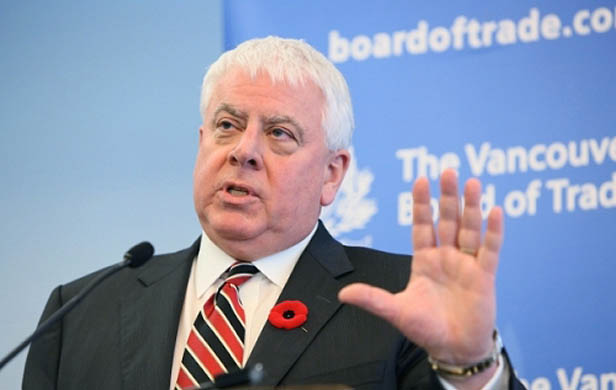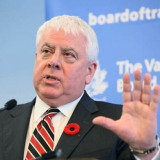
The following is an open letter to Premier Christy Clark from economist and former ICBC CEO Robyn Allan
November 19, 2014
Dear Premier Clark,
Your government is an Intervenor in the National Energy Board Section 52 public interest review. The hearing is to determine if Kinder Morgan’s Trans Mountain Expansion Project is worthy of a public license to construct and operate a twin pipeline. The system will transport more than 890,000 barrels a day of primarily diluted bitumen to BC’s west coast.
Most of this heavy oil is destined for Westridge dock in Burnaby where it will be loaded onto tankers for marine transit. The tanker traffic triggered by the expansion means two oil tanker transits a day in the Salish Sea and Burrard Inlet. A number of oil tankers will be regularly parked in English Bay and Burrard Inlet awaiting loading.
The Province’s application to participate as an Intervenor in the NEB process reads, “the Province would be directly impacted by the project’s economic activity, including that which would result in revenues to the Province.”
I am writing to you to advise you of results of my research into Trans Mountain’s tax obligation and how that fundamentally impedes the Province’s ability to receive revenue.
Kinder Morgan claims that Trans Mountain is a significant contributor to federal and provincial income tax revenues. The company is relying on this as proof it deserves a public licence to triple its pipeline capacity. Pouring tax revenues into Canada is not the story Kinder Morgan tells its US-based shareholders. Promoting Trans Mountain south of the border, Kinder Morgan boasts of cash tax refunds—two in the past five years.
From 2009-2013 Trans Mountain’s combined federal and provincial Canadian corporate tax contribution averaged just $1.5 million per year.
How could this be? The answer lies in complexities of the Canadian and US corporate tax regulation and Kinder Morgan’s tax planning culture which is explained in theattached brief.
I believe Canadians are owed an explanation why this US multinational pays so little in Canadian corporate income taxes. Trans Mountain plans to triple its capacity and because of economies of scale suggests it will pay a tax rate of 25% on its net income leading to about $100 million a year in federal and provincial corporate income tax.
Based on their structure and corporate culture, this is false.
Kinder Morgan does not pay its “fair share” now, and will not pay its “fair share” in the future—to BC or the rest of Canada.
The Province must request that the Canada Revenue Agency undertake a full and comprehensive audit of Kinder Morgan’s activities in Canada.
Sincerely,
Robyn Allan
Economist
cc. Honourable Michael De Jong, Minister of Finance


So help me if there’s an oil spill that ends up fouling English Bay, Jericho or Kitsilano there’s going to be hell to pay.
STOP KM AT ALL COSTS.
As much as I hate to admit this.
Vancouver harbour would probably be one of the “better” places to have an oil spill simple for the fact that we have the “clean up” infrastructure to rapidly deal with it.
An oil spill anywhere else …Georgia Strait( with the Fraser river pushing the goo everywhere), Squamish (with the herring runs, salmon runs, whales,etc.), Puget Sound( “international” disaster with US lawyers salivating at the lawsuits), or Kitimat ( minimal cleanup response teams, lack of access roads to the coast, deep water, horrendous weather conditions….nightmare scenario)
will be far, far worse than a “made in Vancouver” mess.
As Ms. Allan is an economist and I am a farmer who is Directly Affected by the Trans Mountain Pipeline expansion project; I somewhat agree that this expansion project will not see the economic benefits as suggested by Mr. Anderson. However, having said that, the Province of BC will see far more benefits than what the alternative is, that being 980,000 Bbls. per day being railed to the coast by the CPR & CNR. Industry Canada states that currently 360,000 Bbls of crude oil are being shipped both to the USA and other parts of Canada each day. Trans Mountain will continue to ship a third of this petroleum daily as it does now and the national railways will pick up the slack. Perhaps we should be lauding Trans Mountain & Kinder Morgan and if you really want to halt the export of Tar Sands; start with Ottawa and the minister of International Trade, Ed Fast. Stopping Trans Mountains expansion simply means there is a far greater chance of a rail road disaster in the Fraser canyon than there is with a new pipeline.
Brian, there just isn’t that much spare rail capacity to see anywhere near the equivalent of the Trans Mountain pipeline expansion’s capacity to the coast. BNSF – the biggest oil-by-rail shipper – is already putting the brakes on additional oil transport south of the border.
http://www.reuters.com/article/2014/11/12/uk-railways-crude-bnsf-eases-congestion-idUSKCN0IW2D320141112
And new, stricter regs are on the way for fossil-fuel-by-rail transport, which will raise costs. With every spill – and there have been SO BLOODY MANY – as you are well aware, that pressure will intensify.
I hear your concern, but I don’t think it’s an either/or proposition. There is another alternative, which is simply to say that BC should import enough oil for its own needs but not feel pressured into becoming a throughput for exports to China.
Every single additional barrel of oil above the current 300,000//day piped to Vancouver now is surplus to our local needs. All bound abroad by tanker. With virtually zero local economic benefit.
Why this simply MUST be the case is beyond me. We do not need to become Port MacMurray; your farm does not need to be threatened by either oil trains or new pipelines.
Damien, your comment about “Port MacMurry” got me to thinking about the amount of ships that will be plying the inner harbour EVERY DAY.
I was was working below the Second narrows bridge a few weeks back and watched a small coastal tanker cruise through. It was sunny and a slack tide. I cant imagine a huge tanker, fully loaded, heading out the harbour on a foggy, windy day with a rising tide.
Once through the second narrows you now have to deal with busy Vancouver harbour and then the First Narrows and busy English Bay.
And this will happen daily or more often.
Is there enough trained harbour pilots to handle the increase in traffic?
I dare say there will be a ship grounded at some point in the future. Lets only hope it will be
a) During an election campaign
b) The Ship will be stuck on the rocks at West Vancouver
c) There will be minimal leaks but the TV crews will have a field day.
You are thinking ‘inside the box’. We dont need to ‘increase’ our tar sands oil export. What we need is to keep it the same while we focus on expanding renewable energies and other economic endeavors, then in time begin to reduce our oil export as these other industries take root. Its not about picking one way or another to send more oil across our country, its about stopping the expansion and actually moving forward as a country to a sustainable, responsible, and more reliable through diversification, economic strategy.